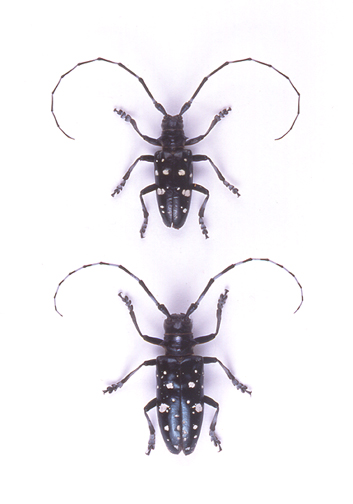Asian Longhorn Beetle (Anoplophora glabripennis)
Pricing: No Specimens Available For Sale
Geographic Range: China & Korea (Introduced to parts of the U.S.A.)
View: Top Sex: Male (top) & Female (bottom)
Size: Length: 2.5-4 cm
The Asian longhorn beetle (ALB) has become an insect that demonstrates the danger of exotic animals being introduced into foreign environments. Away from predators and parasites, the Asian longhorn beetle thrives in the eastern U.S.A. It could place this country's hardwood forests in a state of jeopardy if unchecked. Its favorite trees are maples (Acer spp.) but they will feed on birch (Betula), elm (Ulmus), alder (Alnus), poplar (Populus) and many other deciduous trees. Larvae tunnel throughout the heartwood of a tree, feeding - a process which kills the tree. Asian longhorn beetles probably came over from China as larvae or pupae, hidden in wooden crates or shipping palletes. Adults can be found June through October, usually on the tree from which they emerged or on a new host tree close by. Adult females chew away small depressions in the bark, where a single egg is deposited. Each female can lay anywhere from 30 to 70 eggs. Eggs hatch after 10-15 days and the larvae tunnel under the bark, eating their way into the heartwood where they will eventually pupate. New adults emerge the following summer. Asian longhorn beetle activity can be detected by the egg pits, which will often ooze sap, and accumulation of coarse sawdust around the bases of infested trees. Exit holes made by adults, another sign, can be found on the trunk or branches and are about 1cm (3/8") in diameter. Anyone who observes these beetles in the U.S.A. should contact the Animal & Plant Health Inspection Service (APHIS). New Yorkers who find Asian longhorn beetles on private property can contact the NYC Department of Parks and Recreation at 1-877-STOPALB. For infestations occuring on NYC property, call 646-613-1200. Outside of NYC, call 866-265-0301.

